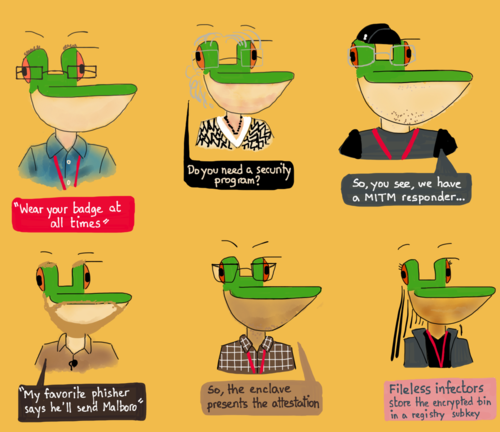In this COVID19 era, online/virtual conferences have flourished. It’s cool we no longer have to waste time at airports or railway stations ✈️ . But I think most of you will agree it’s not “as cool” as “real conferences” (on site). I’ve wanted to blog about this for months, now the time has come — I’m writing and eating my sandwich. Oh, and no, this is not targeting any particular conference I have participated to, if you are organizer of a conference I’ve been (happy) to speak to, don’t take this personally!
If you don’t want to read my ramble about the current status, you can immediately jump to the section with a few solutions “can we improve online conferences”
What’s the status?
I’ve been both speaker at virtual conferences, and “listener” (attendee). Overall, it’s a bit … frustrating.
Speaker for an online conferenceAs speaker, you spend lots of time preparing your presentation (especially if you have to record it yourself, not to mention bandwidth issues if you’re still using ADSL!) and have only very little feedback. It ranges to ZERO question (was everybody sleeping? ) to at most ~10 . Ten isn’t so bad: in real on-site conferences, you usually have less (people are shy), but when you’re downstage, during conference meals or networking, you have tons of questions (“why …?”), contacts (“can I use it for..?”) , or just people saying “Hey it was cool!” (which is just so kind to say). So, as a speaker, you have the feeling your work is useful to others, and that’s rewarding! Unfortunately, with virtual conferences, that doesn’t happen. Three minutes after your talk, it’s just as if it hadn’t existed. I like however the fact that talks are recorded: people can view the talk whenever they want. That’s good. But you (nearly) never hear about them. How many people viewed the talk till the end? or at least 10 minutes of it? I’m afraid the stats would be disappointing (there’s a large offering of good videos online).
 “So, did you like it?” — Feedbacks
“So, did you like it?” — FeedbacksAs an attendee, well, hmmm… how to say it kindly? I get bored and/or distracted. And if I get bored at your talk, you probably got bored at mine! I have tried to follow several online conferences, and in 2020–2021, I only remember 1 talk I followed entirely, and 3–5 talks where I followed parts I was interested in.
Is it all bad?!
No! Fortunately, online conferences have some cool aspects too:
- Very often it is free to attend + no transportation cost/time!
- Several conferences record their talks, so you can watch them any time you wish. You can pause or replay the recording when you need to think, or skip parts which are less interesting to you.
- It’s easier to ask a question by chat than raise your hand in a packed conference room
Can we improve online conferences?
Online conferences won’t ever be like on-site ones (for the good and the bad), but we can probably improve. I list some ideas.
Vary talk formats as much as possible
We can vary the format: standard talks with slides, demos, round tables (saw one at BSides Oslo), interviews (haven’t seen those?), rump sessions (e.g SSTIC), workshops (e.g. NorthSec), quizz, live contest, blooper.
I haven’t every seen quizzes in conferences, though I think it would work well. It can be feedback forms (did you enjoy the last talk? etc), or questions to help understand the audience (their skills, their jobs), or quick questions to get their opinion, or test quizz (why not?) to see if they understood well the talk.
Live contest. The idea is to propose to the audience a short problem to solve. It can be a mini-CTF challenge, or a coding challenge “fix binwalk so it sees this embedded exec”. Several modes are possible : 1 curator and several contributors (after x minutes, the curator compiles the various solutions/discussions), or 1 against 1 (e.g red team against blue team), or everybody discussing in a group.
Compile a blooper. Ask speakers to share some funny errors while preparing their talk (demo crash etc), include videos of the organization crew during preparation, or live.
Shorten talks, keep on schedule and vary format (again)
IMHO, forget about traditional 45 or 50 minute-talks. Online, people won’t listen for more than 30 minutes. Except workshops where they are active.
In recorded talks, as much as possible, provide pointers to given sections of the talk. Example: “at 2'46, we start unpacking the malware”.
⏰ If you have published a schedule, on the conference day, start exactly on time — not before!! - because most of the audience won’t connect ahead of time. If possible, announce the upcoming conference on Twitter (or other social networks) 5–10 minutes before, or an hour before. If people are not reminded, they will forget to attend (happened to me: I forgot to follow a talk I was interested in — at SSTIC if you wan’t to know — fortunately I can see the recording).
Actually, another random thought: most online conferences are on a single day. I’m not sure this really suits the online mode: it is particularly difficult to listen to online talks all day. Rather, having one talk every day of a given week, or one talk every Thursday (whatever day) at a given time etc. This is what @virtualabs does for his live Twitch sessions, and I really like that!
Insert as much interaction as possible
- Create a speaker’s group (e.g THCon has a speaker’s server on Discord, UYHBYS had one on Signal) and have speakers use it. Speakers usually like to chat with other speakers. True, a speaker’s dinner is better , but a speaker group is already something. And it gives you the feeling you are participating to a conference — globally.
- Contact your speakers before the conference (audio, video or chat, preferably over email): to give them information, but also just to know them a little. It’s easier to prepare a talk when you’ve spoken to an organizer, than to a conference you have never been to.
-
Create a channel where the audience can react and ask questions. Many conferences use YouTube’s chat, or Discord for that or online IRC (ha, SSTIC always!). However, an empty channel is like a tomb! It’s perhaps worse than no channel at all. So? So you’ve got to ensure that people participate! If you know some participants, ask them to start conversations on the channel, especially on the day of the conference. Make it clear to them their role (or one of their roles) is to initiate conversations. Once people see the channel is active and has interesting chats, others will join. As an organizer you can also do this yourselves (I know you have many things to do). Appoint a “Community Manager” in the org? During the talk, ensure that people ask questions. If necessary, ask some yourselves.
In the channel, why not organize a drawing contest? the attendee who sends the nicest drawing concerning the current talk? or the best slogan / keyword for the talk? or simply have attendees share a picture of their surroundings? [you might need a moderator for these actions]
 During a former edition of Virus Bulletin, I drew some speakers “Pico-fashion”
During a former edition of Virus Bulletin, I drew some speakers “Pico-fashion”- Some online conference systems allow attendees to react live (raise a hand ✋, ask question live etc). Encourage this as much as possible! If necessary, as an organizer, do it yourself. You’ll be an example to follow.
- Quizz. As I said earlier, I think they can be great for online conferencing.
With great respect to all conference organizers during those difficult times, best regards,
— Cryptax
Article Link: Random thoughts on Online conferences | by @cryptax | Jun, 2021 | Medium

